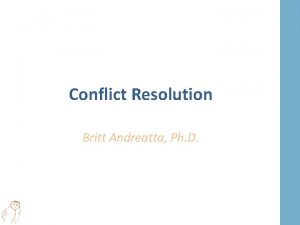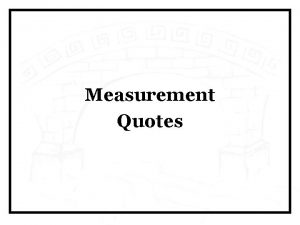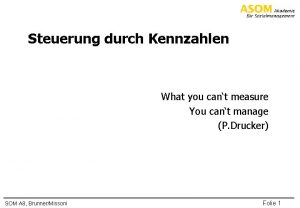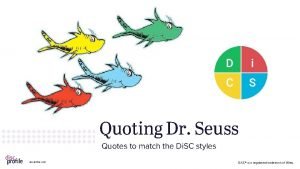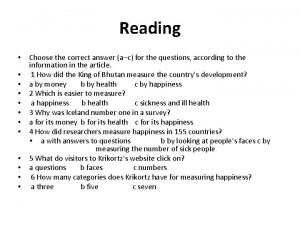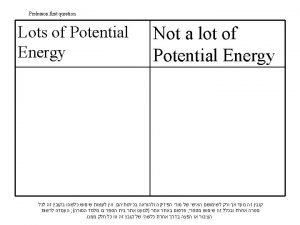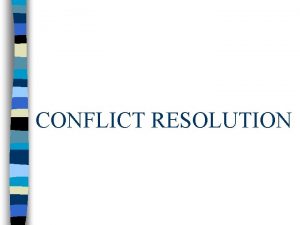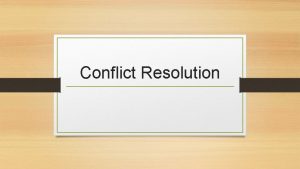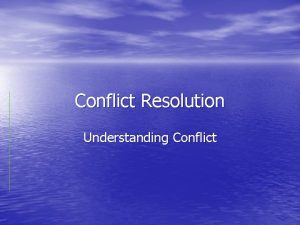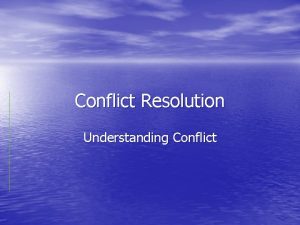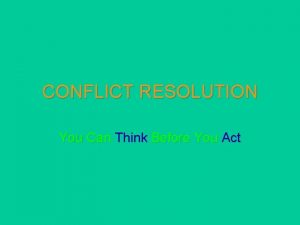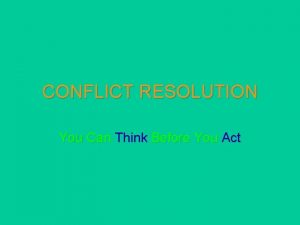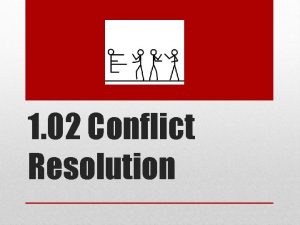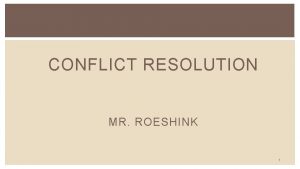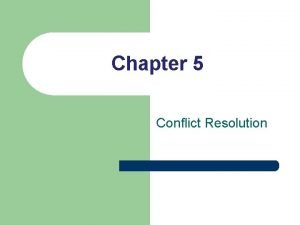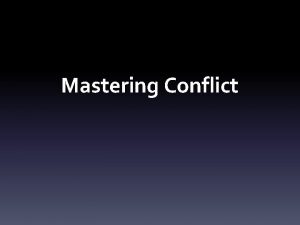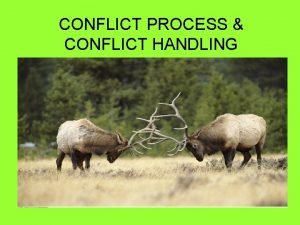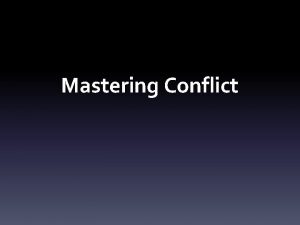Conflict Resolution Whats a conflict Can you think




















- Slides: 20

Conflict Resolution

What’s a conflict?

Can you think of a conflict in your life? You won’t have to share but we won’t believe you if you say you can’t think of one. We all know what conflict feels like, right?

Pair discussion How you could help someone else to resolve conflicts in their life?

The first part of resolving conflicts involves Minding my business

In life, there are 3 types of businesses: • My business - which I manage (or not…!) and • Other people’s business & • Nature’s business … which I don’t get to manage.

The second part of resolving conflicts involves - Distinguishing facts from interpretations so that I can - Notice and choose what I say to myself (my thought, my belief about the situation) AND HOW ?

By using language and thoughts Loving what is 1) Is it true? 2) Can I absolutely know it’s true? 3) How do I react when I think that thought? 4) Who would I be without the thought? Byron Katie

5) Can I turn my thought around into something that concerns me, and therefore that I can be in charge of? In other words, Minding MY BUSINESS and asking: 6) Could this new thought be at least as true? 7) How would I feel if I kept that thought? 8) Would I choose to keep that thought and feel like that?

Turnaround example: Conflict: My colleague is not taking her work seriously, she goes out every night, she arrives at work late, she flirts all day with our clients and I get to do all the work. I don’t think it’s good for our business and it’s not fair to me either. Questions: 1) Is it true? 2) Can I absolutely know that it’s true? 3) How do I react when I think that thought? 4) Who would I be without the thought? 5) Can I turn it around? 6) Could this new thought be as true? 7) How would I feel then? 8) Would I choose this?

What can you do when someone shouts, criticizes, etc… ?

When someone shouts, criticizes, etc. • Ask them what they are concerned about • LISTEN completely • Choose questions/responses that help the other understand themselves more and fear less • Practice compassion: See that every behavior has a positive intention (even when a behavior comes across as clumsy because the person is struggling) – see what the person is really trying to express.

Why do we want to be right? Is it a conscious/mindful choice? Would being happy be your choice? Would you rather be right, or happy?

If you want others to be happy, practice compassion. If you want to be happy, practice compassion. Dalai Lama

What exactly is compassion Define and give examples

Compassion Definition: sympathetic pity and concern for the sufferings or misfortunes of others. Synonyms: sympathy (feeling for, providing support), empathy (feeling into, being able to put yourself in their shoes), grace, humanity, mercy, tenderness, kindness. Antonyms: animosity, ill will, cruelty, mercilessness, meanness. What is more useful in compassion: sympathy or empathy?

Compassion and tolerance are not a sign of weakness but a sign of strength. Dalai Lama


Talk about: • Mindfulness, and management of our different brain parts -> See Resilience and Mindfulness IPC • Choosing ‘being happy’ over ‘being right’ • An awareness of good communication strategies -> see Communication Strategies IPC • High listening skills -> see Listening IPC slides 1 -11 + practice reporting messages (slides 21 + 23) • Remembering that it’s NOT ABOUT YOU • Accessing compassion, being kind.

Also consult: • Listening IPC– see how slides 1 -11 apply • Communication strategies at work– see relevant slides. • Resilience and Mindfulness – see relevant slides
 If you think you can you can poem
If you think you can you can poem Think big think fast think ahead
Think big think fast think ahead Have a daughter so you can argue
Have a daughter so you can argue So you think you can argue
So you think you can argue So you think you can argue
So you think you can argue What is conflict and conflict resolution?
What is conflict and conflict resolution? If you can imagine it you can achieve it
If you can imagine it you can achieve it If you can't measure it you can't improve it
If you can't measure it you can't improve it If you can’t measure it, you can’t manage it
If you can’t measure it, you can’t manage it If you can't measure it you cannot improve it
If you can't measure it you cannot improve it What you can't measure you can't manage
What you can't measure you can't manage High resolution low resolution
High resolution low resolution Oh the thinks you can think quotes
Oh the thinks you can think quotes Why according to robin and jay are people funny
Why according to robin and jay are people funny Think fam think
Think fam think Choose the correct answer ac
Choose the correct answer ac You know minecraft
You know minecraft What comes to mind when you hear the word family?
What comes to mind when you hear the word family? You have more potential than you think
You have more potential than you think When you hear the word scientist what comes to mind
When you hear the word scientist what comes to mind What do you think of when you hear
What do you think of when you hear





